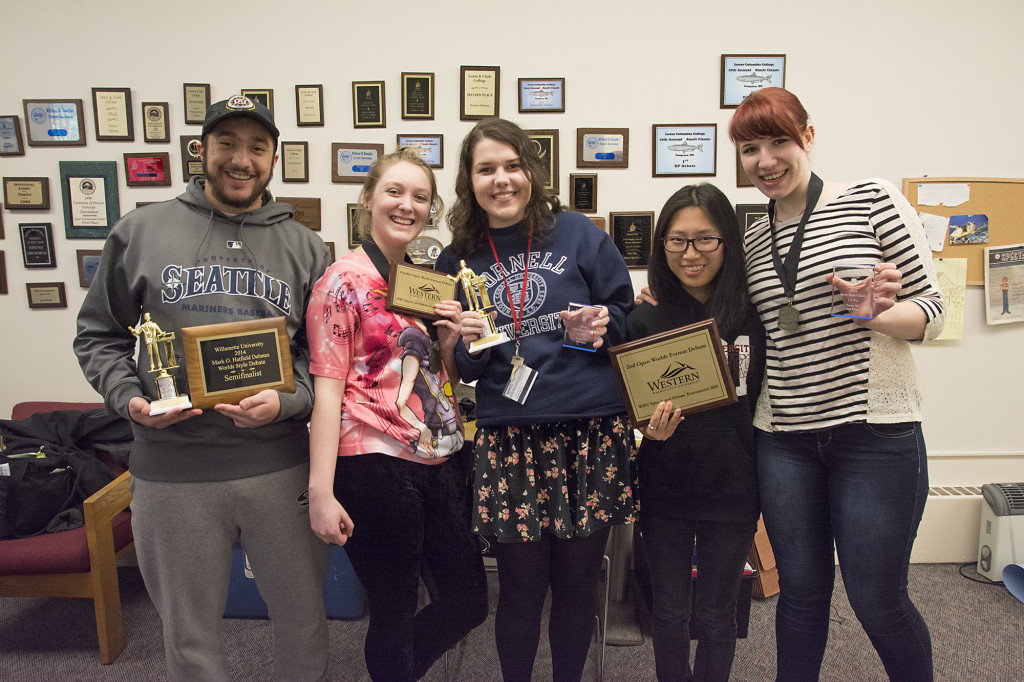There is one topic that is not up for debate: that this is one of the Seattle University Debate Union’s most successful years, which is especially impressive considering its relatively young team.
Over the weekend of April 11-13, the SUDU attended the 2015 US Universities Debating Championship in Alaska, with one of their teams reaching the open quarterfinal round and another team reaching the finals of the first-year division. Among more than 180 teams from across the country—including teams from Yale, University of California, Los Angeles and University of Michigan—SUDU was the only program from the Pacific Northwest to reach elimination rounds.
“We did really well…we haven’t had a team clear two elimination rounds in quite a few years,” said sophomore and vice president of the club, Aine Foran.

Members of the Seattle University Debate Team; Brandon Stickels, Alissa Neuman, Allie Foran, Ren Wilcox, and Mia Kato.
One of the main goals of the club is to compete in about 10 tournaments throughout the year, both within and outside of the Pacific Northwest region. While during the regular season the team competes in smaller competitions with only forty to fifty teams, USUDC is the one time during the year that they see teams from all across the world, even from the University of Zimbabwe.
Foran attributes the team’s performance this year to genuine passion and hard work throughout the season, mentioning consistent success at Pacific Northwest tournaments and efforts to improve as evidence of the club’s demanding, but fun, culture.
“The culture of positivity surrounding how all of us are doing…and [how] we continued to maintain that throughout all of the rounds… was really helpful,” she said.
Sophomore and vice president of finance Wesley Kamikawa also spoke to this point, and agreed that every person who went to the championship was very dedicated. Kamikawa partnered with Foran, and Mia Kato teamed up with Ren Wilcox to reach the elimination rounds.
In preparation for tournaments, members of the club write briefs—one to two pages on a certain topic—every week. They also meet twice a week to have practice rounds and receive feedback from teammates and their coach.
“The team is developing their own personalities as advocates and speakers,” said communications professor and debate coach Melissa Franke. “All things being equal, it’s the people who have charisma and presence who are going to be a little more convincing.”
Franke competed in speech and debate in college and this is her second year coaching SUDU. She watched Foran and Wesley’s Octofinal and was impressed at their intelligence and level of understanding of debate that goes beyond what they have been taught.
SUDU practices the British parliamentary format of debate—in which each team is randomly assigned to either support or go against a topic, has 15 minutes to prepare and then engages in a back and forth of speeches.
During USUDC, one of SUDU’s randomly assigned stances was arguing that people who wish to be parents have a moral obligation to adopt, rather than have biological children.
“The way they made those arguments was impressive,” Franke said. “They’re doing a great job with what I taught them and they’re going so much further.”
Their success is also highlighted by the fact that the majority of club members are sophomores and freshmen.
But beyond learning the art of debate, the club’s other main goal is to engage and teach the community. They hold public debates every quarter on a variety of subjects including foreign policy and topics that affect the campus community. Foran finds that having these public debates generates valuable discussion from the audience, especially in the context of a Jesuit education.
“Being able to explain why you think a certain way is really important,” Foran said. “Just that exposure to different points of view might either strengthen your own point of view or make you consider things you haven’t really thought of before.”
Being a part of debate can also be useful career-wise, according to Kamikawa. He feels that through debate, people can become more comfortable with reacting to difficult situations, such as job interviews.
“Some interviews really like to push you to see if you can handle the pressure,” he said. “I think that’s one place where debate has really helped a lot.”
For Kamikawa, the more he experiences debate the more he finds that it is about listening rather than arguing, and that his listening skills have been sharpened after hours of listening to claims and opponents’ inconsistencies.
Members of the club want to be open and accessible to the community and make sure that anybody who is interested in joining SUDU, or even wants to attend one of their public forums, is welcome to do so—no experience required.
Their upcoming public forum is on May 19 at 7 p.m. in the Bannan auditorium. They will discuss whether freedom of speech should be limited in regards to religion.








